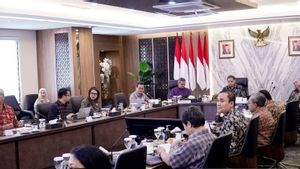Flowers Are Too High, OJK Is Urged To Arrange Pinjol Services Transparently

JAKARTA - Center of Economic and Law Studies (Celios) asked the Financial Services Authority (OJK) to immediately regulate the interest and cost of online massage services (pinjol) in a transparent manner.
BELIOS' Director of Digital Economy and Economist Nailul Huda said that there was no transparent information regarding interest, service, insurance and fine fees.
"Information about interest is only shown 0.4 percent without a clearer statement whether per day, per week, or per year," he said in a statement to the media, Monday, October 9.
Based on the partial'' interest information, he said, a survey from APJII showed that the main factor in borrowing in loans was cheap interest. In fact, when compared to other financial institutions, borrowing interest per year is very high.
"With an interest rate of 0.4 percent, borrowing interest per year can reach 144 percent, or 1.4 times the principal of the loan," added Nailul.
Meanwhile, the Executive Director of Celios, Bhima Yudhistira, added that so far it seems that the loan regulation has been made too soft. He also assessed that there are indications that the arrangement in the loan industry is not detailed regarding the loan interest limit, and the cost of services.
"It seems that there are those who take cover behind digital financial innovation, so it seems as if consumer protection is often number two. As a result, loan players set interest and service costs depending on the agreement, not explicitly regulated in POJK," said Bhima.
For this reason, he requested that the issue of the upper limit on the loan interest be included in the POJK as a form of protection and literacy for prospective borrowers.
"It is better if the OJK dares to change the provisions in the POJK revision related to Fintech or create a new POJK which contains the provision that the maximum Fintech interest limit should not be higher than the bank KTA loan facility, which is around 10-25 percent per year," continued Nailul.
SEE ALSO:
He also suggested that productive loan interest should not exceed 9 percent per year.
"In addition, we also ask the OJK to impose sanctions if the Fintech company violates the provisions of the upper interest limit," said Bhima.
He further revealed that apart from the maximum interest limit, the transparency of interest when the financial literacy of loan users is still quite low. According to Bhima, the regulation of the transparency of loan interest is also important in order to increase the education of prospective borrowers.
"There should be no lending advertisements, especially on social media or contracts agreed between loans and borrowers, which call daily interest, because 0.4 percent per day the impression is small, but if accumulated per year equivalent to 144 percent is very expensive. OJK should require loans to include interest per person or per year even though the loan tenor is shorter than other financial institutions," concluded Bhima.


